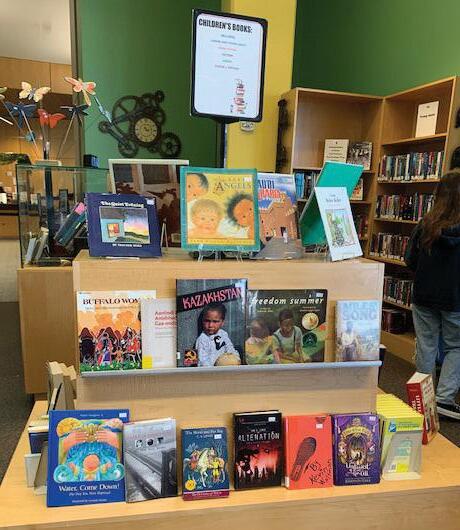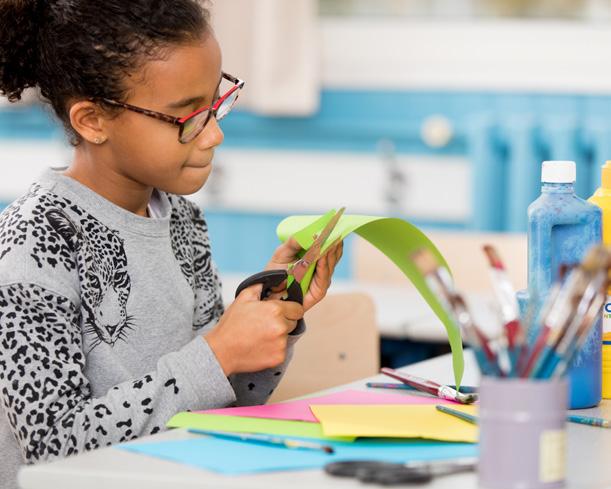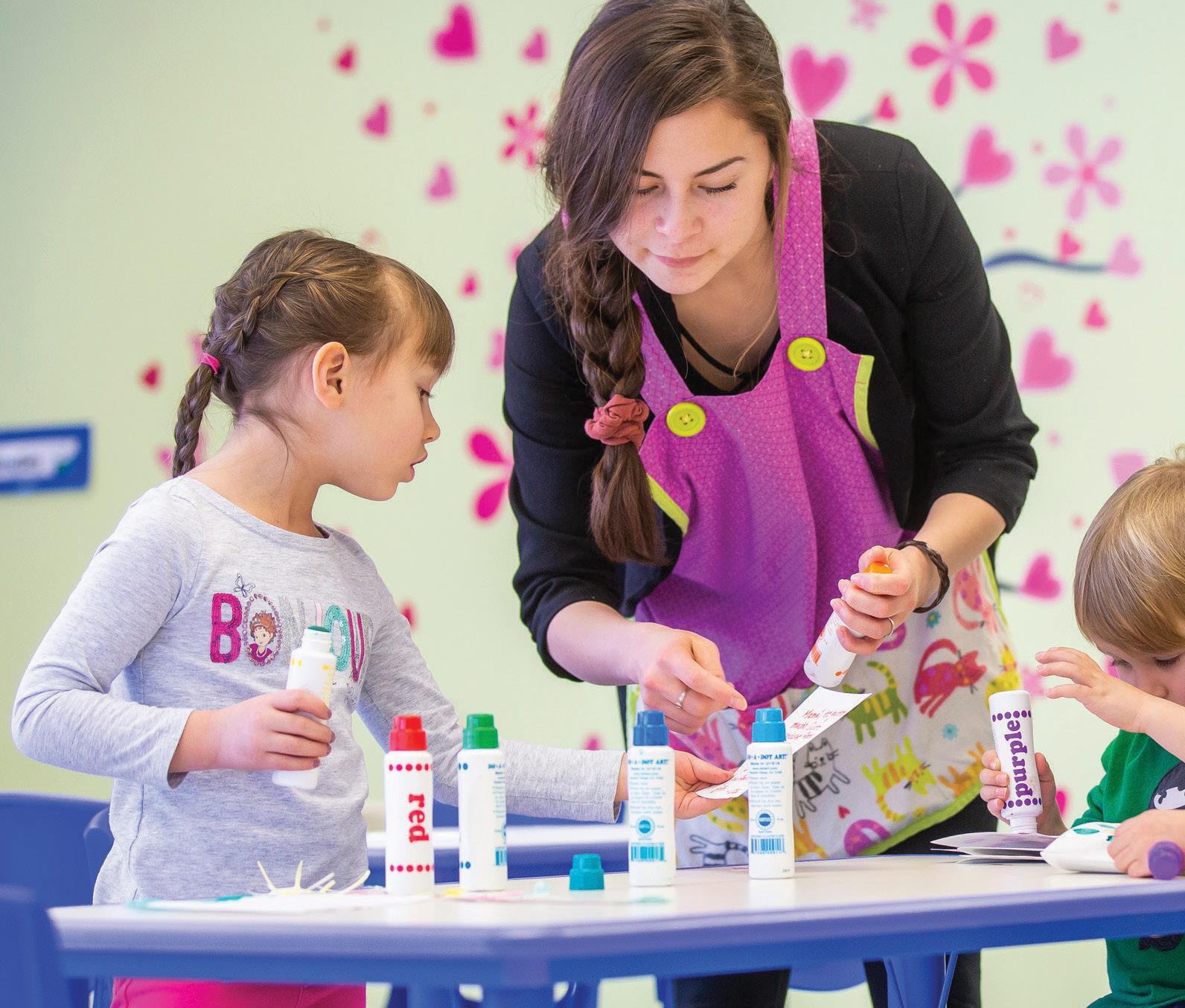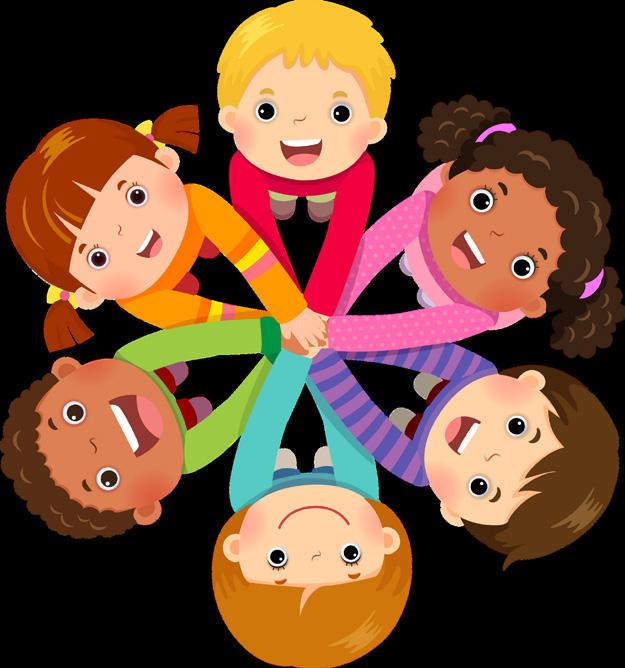

Talking about MENTAL HEALTH with Children Set Your Child on the Path to Success by Reading Aloud 7 Minnesota Family | Spring 2024 | $7.00 Steps to More Helpful Children Raising HAPPY TEENS






30 22 16 26 Copyright © 2024 Minnesota Family. Content in contributed articles, and content in advertisements, is not verified by Minnesota Family. Minnesota Family will consider submissions from writers with a good message on their heart. Minnesota Family reserves the right to select articles for each edition based on fit, and values diversity. Minnesota Family offers advertising space, advertisers submit print ready ads to Minnesota Family. Arrangement, information, and format protected by copyright laws. No information may be reproduced in any form without written consent of the publisher. Minnesota Family and its members assume no liability for errors or omissions. Information is provided directly by the corresponding agencies. It is considered “self-reported data” and is not verified by the publisher. Contact Minnesota Family | Advertising: Info@MinnesotaFamilyMagazine.com | Editorial: Editors@MinnesotaFamilyMagazine.com ON THE COVER The Plevell family at Belle Prairie Park, Little Falls, Minnesota.
Photo by Christina Johnson



Spring 2024 | Minnesota Family 03 34 The Power of “Yet”: Cultivating a Growth Mindset in our Children 32 Self-Compassion: Befriending Ourselves 22 Seven Ways to Connect with Grandparents Long Distance 30 Raising Happy Teens 16 Family Dinner is an Essential Family Meeting 26 Set Your Child on the Path to Success by Reading Aloud 10 Teach Your Children to Become Money Masters 28 Preventing Burnout: 5 Practical Tips for Caregivers 24 Teachable Talents 14 Facilitating Conversations with Children About Mental Health 07 Comic 07 Meet the Writers 07 Advertising Index 34 18 The Power of “Yet”: Cultivating a Growth Mindset in our Children Amanda and Jason 08 Seven Steps to More Helpful Children







than just a store. . .
More





47 E Broadway / Little Falls, MN 56345 710 W Germain St / St. Cloud, MN 56301 Your complete experience!
Stop in and browse the Friends Bookstore
We have good quality used books and media, plus a variety of vintage and collectible books at bargain prices. You’ll find popular novels, classics, thrillers, history books, cookbooks, children’s books, and more!

Staffed Hours
Monday - Thursday
10 a.m. - 8 p.m.
Friday
10 a.m. - 6 p.m.
Saturday
10 a.m. - 5 p.m.



Shopping while the Bookstore is not staffed?
Drop your check or cash in the secure drop box located at the front of the store!
All proceeds support the St. Cloud Public Library and the Great River Regional Library System.




Located right inside the main door of the St. Cloud Public Library. 1300 W. St. Germain St. Cloud, MN 56301 LOVE TO READ? ON A BUDGET?
FUN FOR THE WHOLE FAMILY! Theatre Music Dance Comedy Summer Camps Art Classes Studios Galleries 913 W ST. GERMAIN ST • ST. CLOUD




MEET THE WRITERS


Emily Goenner Munson contributed Family Dinner is an Essential Family Meeting on page 16.
Sandra Gordon wrote Teach Your Children to Become Money Masters on page 10 and Teachable Talents on page 26.
Tanni Haas, Ph.D. contributed Raising Happy Teens on page 30.
Melinda Pedersen contributed Self-Compassion: Befriending Ourselves on page 32.
Jill Morgenstern wrote Seven Steps to More Helpful Children on page 8, Set Your Child on the Path to Success by Reading Aloud on page 26, and
ADVERTISER INDEX
Amg Promotions 29 Art In Motion 25 Baby's On Broadway 4-5 Bravo Burritos 36 Chris Hauck & Company Real Estate 17 Christina Johnson Photography 21 Deters Accounting And Tax 29 Ecowater Systems 21 Evenson Decker, P.A. 29 Great River Regional Library 35 Heartland Security 17 Jaeger Lawn Service 33 Jim's Auto Service 27 Krump Benefit Consulting 21 Lake Superior Zoo 07 Luther Honda St Cloud 20 Mary Mcgowan Real Estate 27 Milestones 15 Neighborhood Plumbing 23 Once Upon A Child 17 Polipnick Insurance Agency 29 Reach Up 17 Screentime Indoor Billboards 33 Snappy Auto 12 St Cloud Friends Of The Library 06 St Cloud Orthopedics 21 Stay Clean Detailing 06 Sunny Mary Meadow 13 Surface Specialists 31 The Paramount Center For Performing Arts 06 Visit Saint Cloud 33
our Children
Brandy Browne contributed Facilitating Conversations with Children About Mental Health on page 14, Preventing Burnout: 5 Practical Tips for Caregivers on page 28, and The Power of “Yet”: Cultivating a Growth Mindset in
on page 34.
to Connect with Grandparents Long Distance on page 22. 14 26 30 16 10 26 28 22 32 34 08 EXPLORE MORE at the LSZOODULUTH.ORG Open Daily | Free Parking! All NEW Tours Available NOW! LEARN MORE AT Spring 2024 | Minnesota Family 07
Seven Ways
to More Helpful Children
 By Jill Morgenstern
By Jill Morgenstern
I watched out my friend’s window as her 12-year-old chopped wood in the backyard. I wasn’t sure which was more amazing, that he was helping without having been asked or that my friend was allowing her son to use an ax, seemingly with no undue anxiety on her part. He entered the house, taking off boots and gloves before shoving a couple of logs into the wood stove.
Why was her child taking on such grown up tasks when I could barely get mine to clean their rooms? “She must need the help” my own father casually responded when I described the scene to him later that evening. I needed the help too, I decided, and would figure out how to get it.
Many years of careful study finally produced a teenager who took out the garbage without being asked and a four year old who was almost solely responsible for the feeding of our cat.
It’s easy for household chores to drop off our busy to do lists when everything from homework to swim team to piano lessons battle for our family’s limited time. However, even if we think that getting the child to do the housework will be harder than doing it ourselves, household chores can be just as beneficial as any extracurricular activity for our children’s social and emotional growth. Experts agree that household chores can give children confidence and self-discipline, encouraging children to see themselves as an indispensable part of the family. Luckily even a child as young as two or three years old can begin simple chores.
08 Minnesota Family | Spring 2024
Here are some tips I’ve found helpful along the way:
Whether your children are toddlers or teenagers, these tips can help transform household chores from a battleground to a regularly scheduled part of the day.
1
Give your child choices
Children like feeling as if they have choices. If they are able to choose from a variety of chores, they are more likely to accomplish the chores happily. One child may prefer emptying the dishwasher while another enjoys setting the table. Compliance is more likely if a child’s preferences can be honored.
2
Make sure chores are age appropriate
Even toddlers and preschoolers can help set or clear the table, feed pets, sort silverware out of the dishwasher, put toys away, put laundry in the hamper, or even run a Swiffer duster around the living room. Giving children chores that they can complete themselves helps with feelings of confidence and gives them a sense of accomplishment.
3
On the other hand…
Doing chores together can make them more enjoyable. Preschool age children often respond well to a simple clean up song. Some chores, such as unloading the dishwasher, easily lend themselves to cooperation and they get done faster too!
4
Try a visual reminder
Just as adults take satisfaction in checking off a to-do list, a chart on the fridge can help children track their accomplishments. If the child is too young to read, draw a small picture or use clip art to represent the chore in a concrete way. Clothespins or Velcro can be helpful in making the chart interactive.
5
Teach, and then check for understanding
Model the chore for your child and then make sure he or she has understood. Having them show you how they will do the chore ensures that they paid attention to instructions and that you can trust them to do the chore independently.
6
Offer an allowance. Or not.
While everyone agrees that chores are a great help in raising productive, responsible children, the verdict is still out on whether or not an allowance is necessary or helpful. Many experts seem to condone an allowance. Others condemn one. Of course, there are benefits both ways. Choosing to provide an allowance means that children can learn to manage money at an early age and of course provides additional motivation. Others feel strongly that children should help the family without financial reward.
7
Have a back up plan
If you choose not to offer an allowance, it may help to have some other motivation. The words “as soon as” can be almost magical in getting children to lend a hand. “As soon as you finish your chores you can play Roblox or watch TV.” “As soon as you’re done with your chores we’ll be able to go see your friends.” “As soon as your chores are finished, I’ll be ready to start making those cookies we were talking about.” The use of “as soon as” puts the responsibility for doing chores in the child’s own control, even as it makes him or her realize that Mom or Dad is running the show. In these scenarios, the parent doesn’t really care whether or not the child gets to watch TV or eat cookies. If the child wants to play Roblox, she will get her bed made. If he wants to go see his friends, he will vacuum the living room. And if not, the child knows that the blame is his or hers alone.
Spring 2024 | Minnesota Family 09

Teach Kids to Become
Money Masters
By Sandra Gordon
When Sunny Lee’s identical twin boys, Jason and Matthew, were 2 years old, she began teaching them about money by working up to the concept. “If I was folding laundry or sweeping the floor, I would say, ‘Mommy needs your help,’” says Lee, author of Is Your Child a Money Master or Money Monster? Each tiny contribution was followed by an enthusiastic, “That was so helpful! Thank you so much!” and a hug.
Starting in kindergarten, the boys began earning a weekly $3 “commission” for not only doing these sorts of household chores, but for reading books they checked out from the local library and writing a short book report. Lee created a reward chart she initialed when the boys finished their projects. “To earn their commission, they not only had to complete their tasks, but do them with a good attitude,” says Lee. At age 7, each son opened a checking account at a bank they chose so they could see where their money was growing safely, and a few years later, a 529 college fund and a Roth retirement IRA at a brokerage firm so they could learn how to invest their earnings.
By the third grade, the boys had each finished more than 200 book reports. Their third-grade teacher gave them full credit for the reading she required in class. But the boys wanted to participate anyway because they liked to read!
As time went on, Lee and her husband, Thomas, began upping the ante, incentivizing each boy for good grades as well. Every A grade they earned in a subject netted them $5. All As on their semester report card netted them a bonus of $120. Over time, their earnings began to mount. Now, at 15, both sons have more than $10,000 in each of their college
10 Minnesota Family | Spring 2024
funds. “They both want to become doctors,” Lee says. They have their college picked out and have already taken a tour. “They understand that they will pay for their college, not their parents,” Lee says.
Lee’s passion for teaching her boys about money through a system of reminders, routines and rewards grew from her own experience with poverty. Growing up in Suncheon, a scenic agricultural and industrial city in South Korea, Lee saw her factory-worker parents struggle financially. Inspired by their work ethic, however, Lee asked her mother for a job. At 7, Lee
“From getting the “gimmes” in retail stores to saving for college, money is tough parenting stuff. But if we teach kids how to ride a bicycle and learn to play well with others, money should be in the mix too.”
began to clean the house after school. Her mother helped her open a personal bank account to deposit her earnings. Lee dreamed about becoming a millionaire. Years later, however, when Lee estimated her savings to be around 1 million Won in Korean currency ($1,000 US dollars), she went to deposit more money but discovered that her bank account was bare. Desperate to pay the bills, her mother had taken Lee’s savings without telling her. “It was devastating,” Lee says.
The experience fueled Lee’s resolve to become a professional investment advisor and help her boys become master masters. “From the beginning, it was important to me that my sons understand financial security and build the confidence to know they’re in charge of their money and their life, even if they work for someone else,” she says.
From getting the “gimmes” in retail stores to saving for college, money is tough parenting stuff. But if we teach kids how to ride a bicycle and learn to play well with others, money should be in the mix too.
In addition to paying kids a “commission” to complete weekly tasks with a positive attitude, Lee offers these 6 money habits she developed to help her sons learn to thrive financially that you may find invaluable, too.
1.
Talk about money. From an early age, Jason and Matthew began hearing positive messages about money Lee repeated whenever she felt it was appropriate, such as “Money is a vehicle to make our lives comfortable and enjoyable” and “money is meant to be shared.” “Positive messages toward money are fundamental to helping children develop the good habits that will help them learn to manage their money well,” Lee says. It’s never too early to start talking about money. “Even 2 year olds can begin to understand,” she says.
2.
Start saving early. When you’re shopping and your kids ask you to buy them things, don’t give in. Instead, encourage them to create their own spending power by thinking about what they could do to buy that for themselves; suggest age-appropriate chores around the house, such as folding laundry and watering the plants. “Even 2 and 3 year olds can water a plant or fold their own socks,” Lee says. The results may not be perfect, but if done to the best of their ability and with a positive attitude, that’s good enough.
“When you pay your kids for their chores, tell them: “This money is like a seed. If you plant it now and take great care of it, it will grow into a big tree in your future. You can do it because you’re a money master!” Lee says. “Your children will begin to think of themselves and their money in a positive way, which is the first building block of success.”
3.
Make results visible. For young children, a small transparent piggy bank that can fill up fast is an important teaching tool. “The success of seeing their money increase will inspire them to keep going,” Lee says. When the piggy bank is full, take a trip to the bank; have your child deposit his earnings into his own bank account, with a reward for the deposit, such as enjoying the bank’s free hot chocolate. “Every time we came back from the bank, Jason and Matthew were eager to earn extra money by doing more chores around the house,” Lee says.
Spring 2024 | Minnesota Family 11
4.
Share your shopping strategies. When you’re shopping with your kids, talk about your savings strategies. Do you use coupons or money-saving apps at the supermarket? Why are you shopping at Marshall’s rather than Nordstrom (or vice versa), or using that Groupon in a restaurant? Are you taking the kids to an orthodontist in a distant town because it’s 50 percent less? Don’t keep your saving strategies to yourself. Kids learn to be smart spenders by soaking up your real-world examples, Lee says.
5. Play money games. Learning about personal finance should be fun, so encourage your kids to play money-related interactive online video games. PracticalMoneySkills.com is a site Lee recommends, especially for its games for all ages, including Cash Puzzler, Financial Football, Financial Soccer, Money Metropolis, Road Trip to Savings, Peter’s Pig Money Counter and Countdown to Retirement.
6.
Celebrate successes. Every Saturday, after Jason and Matthew completed their weekly tasks, Lee would present each boy with their $3 earnings.
If they did anything extra, such as taking out the trash, she would give them an extra dollar as a bonus. “Every time I handed the money to one of them, the rest of the family clapped, wore big smiles and said, ‘Great job! You did it!’”
Celebrating another person’s accomplishment teaches us to be generous,” Lee says. It’s motivating too. “Children need to know their works are appreciated and that their parents are proud of them.”
Overall, “because I taught my boys about money principles from a very young age, it made life easier for our entire family,” Lee says. “Even better, they learned to love their own success.”
12 Minnesota Family | Spring 2024

Facilitating Conversations with Children About Mental Health
By Brandy Browne
The Center for Disease Control (CDC) estimates that one in six children ages two to eight in the United States has a diagnosed mental, behavioral, or developmental disorder. In the United Kingdom, we also know that 75% of mental illnesses start before the age of 18.
It’s clear that – just like adults – children also struggle with their mental health.
While we may not be able to eliminate all of our children’s mental health challenges altogether, there are ways that we can support them.
One of the best ways we can do that is by proactively opening up the lines of communication. By exposing kids to the basics of mental health from an early age, we can help them:
Understand that mental health challenges are normal
Feel comfortable and safe when opening up to others
Better prepare themselves for future mental health challenges
Talking About Mental Health with Children: 5 Practical Tips
So how can we speak to kids about mental health? It isn’t always easy (especially for adults who didn’t grow up talking about mental health with their own parents) but it’s possible!
Here
Draw
are five practical tips to consider.
upon a medical analogy
If you have an ear infection, your ear is not draining properly. If your arm is broken, the bone needs care to get it back into alignment.
Similarly, if your brain is struggling, it needs appropriate care to get back to a good place. The brain is responsible for feelings, thoughts, etc. If the brain is off-balance, it needs care – just like any other medical issue.
14 Minnesota Family | Spring 2024
Use concrete language that is easy to understand
Take a look at the following example to explain how a panic attack might feel.
“If you’re riding your bike, and a vehicle races by you and barely misses you, your heart will be pounding. You might feel nauseous. Your hands might feel sweaty. It is a normal response to your body feeling threatened. A panic attack feels the same way. If your body or mind feels threatened, it will react.”
Explain to your child that the potential “triggers” for the panic attack may vary from person to person, but the physical “feelings” and “symptoms” are similar.
Have frequent conversations
As one goes through the seasons of life, it is normal for symptoms to come and go, as well as change in severity. For example, after losing my father, my depression has flared up. However, it is not always so bad. As my circumstances change, so does my mental health. By having conversations frequently with children, it can help them to understand that mental health status and issues can change frequently, based on a number of factors in our lives.



Discuss self-care and prevention
Speak often and freely about your own self-care and model how to cope effectively with mental health challenges. I do not function well when I am exhausted…it tends to put my anxiety into overdrive. My oldest is the same way. We have frequent conversations about the role that sleep plays in how severe our anxiety is, and I attempt to model a healthy sleep routine for her.
Finally, do not be afraid to ask about suicide
It’s common to be afraid that asking your child about suicide will “give them the idea.” This is not true. You can’t make someone consider suicide by asking them about it. You can, however, save a life by asking. Someone considering suicide may feel considerable relief by someone caring enough to ask. Many who attempt suicide are not looking for death. They are really looking for relief from emotions that they do not feel equipped to cope with.


Spring 2024 | Minnesota Family 15
www.milestonesmn.org navigator@milestonesmn.org 320-251-5081 Your loving home is a child’s loving start. Start your career in child care. Receive financial support for training requirements and a hiring bonus.
individualized help from a Workforce Advisor. ChildCareAwareMN.org/EmpowerToEducate ChildCareWayfinder.org
171392_HZ.indd 1 1/29/24 10:36 AM
Get
888.986.8207
Family Dinner is an Essential
Family Meeting
 By Emily Goenner Munson
By Emily Goenner Munson
As an instructor of business communication, I teach my students about business meetings. We discuss the important role meetings play in companies, from monitoring progress and projects, to sharing ideas, making plans and decisions and more. In class, we also talk about how to behave professionally in a meeting. Many parenting experts suggest family meetings that echo the purposes of business meetings, if not the formality. While meetings may work for some families, for mine, a daily meal was far more effective than formal meetings.
Family dinner is often suggested for the many benefits it gives families. Research has shown that consistent family meals have a series of benefits for children and adults. Shared meals contribute to better family relationships and healthier food choices. In households where shared meals are habitual, children tend to have better grades, higher self-esteem, more resilience, lower risks of substance abuse, depression, anxiety, and obesity. With all of these benefits, the family meeting at mealtime is worth the effort.
Family meals are perfect for:
• Checking-in—how is everyone? you get a sense of everyone’s mood and if anyone needs a follow-up later
• Sharing —what went well during the day? What challenges are people facing?
• Discussing current events —bring up news topics or school events; address issues and ask everyone to share their opinions
• Asking questions —find a list of questions online or buy a game that includes family questions; my kids still talk about having to answer the dinner question. Questions can be anything from the funny—what animal would you be? --to the serious—how did you help someone today? asking questions helps emphasize your family’s values
• Laughing —sharing funny stories or jokes helps people bond
16 Minnesota Family | Spring 2024
Try to keep family mealtime about sharing with each other. Avoid planning and scheduling, avoid arguing about chores or homework. This is a time to connect with each other in meaningful ways. Consistent family meals establish a solid routine children can count on; they feel attached to their families and know support is present. Including kids in the preparation or clean-up also develops responsibility. Shared mealtime teaches your kids to navigate social situations, take turns talking, and carry on a conversation—all of which are vital skills in the adult world.
Both meetings and meals are important elements to healthy families and teach children valuable skills, but the meal need not be an evening meal. I know families who share breakfast as their family time and, for one summer, my family had the noon meal together since everyone was working or at sports events later in the day. You could even make family snack time a habit. The most important thing is to consistently spend time together.
For years, I fought with my kids to set the table, sit, eat, talk, clear the table. Now, we have family meals full of conversation and laughter. They help prepare and clean up after meals. Sometimes, my boys are a little rowdy, but I see evidence of the foundations I set during family meals, and I delight in the mealtime sharing.







FREE programs for children Birth to 5 & pregnant moms. A CCEPTING APPLICATION S CENTER BASED Children attend classroom programs 7 hours per day Monday - Thursday HOME VISITS Weekly home visits with socializations twice a month CHILD CARE Children attend center based program with childcare Monday - Friday, minimal child care fees apply 320-253-8110 reachupinc org 350 Hwy 10 S Ste 100, St Cloud, MN Serving families in Stearns, Benton & Sherburne Counties Scanto LearnMore!


Amanda and Jason
Amanda and Jason have been married for 12 years. They are a family of six. Amanda blessed Jason with Evan and Kaden from her previous relationship, they had Dash from their union and then they adopted Isaac. Isaac joined them when he was in his early teen years, a friend of Evan and Kaden's, they ended up adopting him after fostering for a couple years.
18 Minnesota Family | Spring 2024

q: What is the process for becoming a foster family?
Amanda: It was a lot! We had to have the house evaluated, we had to make some changes, it was kind of like credentialing for daycare which I did when the boys were young. We had to have escape plans, we had to meet with the county several times just to get approved. Once we were licensed there was no waiting for kids, there was so much need. They sent us adolescents and would have sent us more if we had the room. I remember thinking "my goodness there is so much need here." Jason is the perfect mentor, so even though adolescents bring challenges of their own, this was the age of our older kids so at the time it seemed to make sense, and they need so much. If people are willing to share their lives with them, this age group needs positive guidance. I don't remember a lot about the credentialing process mostly because we just knew it had to happen and so we were just walking through the steps to get Isaac here. The steps didn't matter, the end result did.
q: Advice for families interested in homeschooling?
Jason: Let your kids teach you what they're interested in.
Amanda: There are multiple programs out there so don't just settle for the first one and feel free to change just because you sign up for one this year doesn't mean you can't do it differently next year. Also give yourself some grace, you're learning just as much as they are.
q: How do you build a business while caring for yourself and your family?
Amanda: It can be a challenge but building our businesses together is one way that we do care for each other. Because both Jason and I are growing so much through this process we're healing old wounds with every stressor that comes up, we're taking on new challenges and we're doing it together. I love that the boys are seeing that. We all help each other because we all have a common goal. The boys help with things at the clinic as well as working with Jason. The ladies at the office even have fix-it tickets and a special spot on the cork board that Jason comes in and takes care of. We care for each other's needs just like every other family. And because we're both entrepreneurs we understand each other's stress and I think that helps us pull together more to make sure each of us is getting our needs met and time away.
q: Cutest kid story?
Amanda: I actually have kept a journal for each one of all the funny things that they would say and do so that we could give it to them when they have their first kids or got married somewhere down the road. I remember one time, Evan really wanted apple pie the night before but it wasn't ready. The next morning, he wasn't 2 minutes out of bed, and he came to the top of the steps rubbing his eyes. He couldn't even see yet and he was saying, "Evan, Evan apple pie?"
q: What are your greatest hopes for your children?
Amanda: It sounds simple, but it really does come down to happiness. Not a happiness just for themselves but that they are contributing all of who they are and enjoying their life as they do it. The greatest happiness comes from getting to be all of who you are and seeing the world benefit from it.
Jason: Being happy and successful in whatever sense of the word that means, living up to their potential and capitalizing on it.
q: What are you most looking forward to?
Jason: I am so excited to watch them turn into the people that they were meant to be, watching new skills continue to develop every day, and watching them find excitement and joy and the things that they do.
Amanda: I'm most looking forward to all the little things. Having older boys and now having a younger boy I can
Spring 2024 | Minnesota Family 19
see how fast they change, and it all goes. So, I want to spend time in the moment, have the Saturday morning pancakes, and the family movie nights, and not wish it all away because I'm so excited to get to the next thing, but I am excited for all those things too.

q: What have you learned from your family?
Jason: Humility, I think a lot of times as a parent you want to take the “it's my way or the highway” approach. A lot of times you just want to be right, and you want them to listen, but in reality, they know what they need a lot more than we do so I think the biggest things that I've learned from my family is how to be humble. Knowing when to admit when I'm wrong or when I am not being t he best version of myself, I have to take a step back and come from that place of humility and honesty.

q: Advice for newlyweds?
Amanda: Know that a honeymoon can last forever. Don't buy into the idea that it's going to be only for a short time. keep making it happen.
Jason: Give of yourself as often as you can, find out how each other gives love and receives love and do that as often as you can.












20 Minnesota Family | Spring 2024
Ultimate Family Van
Honda Family! Scan to Learn More lutherhondaofstcloud.com
The 2024 Honda Odyssey Experience the
From the







StCloudOrthopedics.com Sartell & South St. Cloud DEBORAH KRUMP An Independent Agent Representing Aflac 320.217.6040 1407 33rd St. S Suite 109 Saint Cloud, MN 56301 deborah_krump@us.aflac.com Z2301433 Aflac | WWHQ | 1932 Wynnton Road | Columbus, GA 31999 EXP 1/25 CENTRAL MINNESOTA’S WATER EXPERTS What’s in What’s in your water? your water? (320) 251 - 2505 Ecowaterminnesota.com

to Connect with Grandparents Long Distance Ways
By Jill Morgenstern
As a child I was jealous of kids who could visit their grandparents after school. Having grandparents close by seemed like it would have been so much fun! Back then even making a long distance phone call to a grandparent was an expensive proposition. These days grandparents have many more options! Even if they can't visit in person as often as they would like, grandparents are finding new and inventive ways to maintain a close, cozy relationship with their grandchildren.
Gabrielle Nidus, for example, discovered a resourceful way to keep her son's and mother's relationship close. Her mother gives her son daily piano lessons online. She describes their virtual interaction: "It's all virtual. It's pretty amazing. They play piano and then talk. Which my son insists on. She's all by herself so I think she appreciates the company. It is truly amazing to see. It is a new bond between them." In a similar way, despite living on opposite sides of the country, my youngest child keeps a close relationship with her grandparents by using FaceTime chats.
If you're looking for ways to engage your kids with their grandparents, try some of these ideas:
a Book Together
My mother calls my eight year old daughter at 10:30 each morning for another chapter of The Borrowers. This connection not only serves to keep her connected with her grandmother but has all the benefits of reading aloud, such as building her vocabulary and giving her a positive attitude toward reading.
22 Minnesota Family | Spring 2024
Read
Online Games
Play Try
Just because you can't get together in person doesn't mean that game night is out of the question! There are many opportunities to play online games such as Scrabble Go. Facebook offers Messenger Kids which unlike the adult version offers games to play. Just as traditional board games offer educational benefits during play, online games can help develop skills such as vocabulary and math.
and Email
What a great way to practice writing while putting a smile on grandma or grandpa's face!
the Post Office
a Video Chat
Many families are using Zoom and FaceTime to keep grandparents and grandkids connected. My own family has established a weekly Zoom call with my parents, brother, nephews and children all participating on the same call.
Jen Morrison, a grandmother of three, is keeping up via FaceTime since she can not have her usual visits in person. "We have lots of FaceTime calls with our granddaughter in Arkansas. Usually it's when she's eating dinner because that's the only time she's pretty stationary. And she likes the entertainment while eating. It's a great way for us to keep up with her."
Take Create Text Visit
Personal correspondence always brings a smile and is a great improvement over the usual stack of bills and junk mail. The Touchnote app allows children to mail postcards from a phone, complete with a picture. As an added bonus, kids get to practice their writing skills and conventions of letter writing.
an Online Class Together
Kids may be interested in taking an online class alongside their grandparents. Find something that interests both kids and adults such as a yoga or dance class. Online schools such as outschool.com offer classes that appeal to different age groups and offer a wide variety of courses, such as a Harry Potter cooking class.
Online Artwork Together
Apps such as Zoom offer a screen sharing option that lets kids and grandparents create artwork together. What a fun way to create!

Spring 2024 | Minnesota Family 23
Teachable Talents
By Sandra Gordon
When my daughter was in the 4th grade, a proud tear sprang to my eye when her teacher, known to be a stern taskmaster, declared: “Rebecca has something that can’t be taught: Motivation.”
Rebecca, my shy, eldest child, was a rule follower who always tried her best. Still, was she inherently self-motivated or just trying to please Mrs. Mekka by completing her assignments? I couldn’t be sure. But her teacher’s comment got me thinking about how character traits develop.
Are they born or made?
It depends. Aside from self-motivation, which can be challenging to impart to others, many seemingly innate qualities can be learned, including creativity, empathy and selfconfidence. Here’s how to instill these three valuable virtues in your kids--and even yourself. As our experts will attest, all it takes is a little homework.
Coaxing Creativity
Using your imagination to create something new is a rewarding life skill anyone can develop.
“Creativity is born from a child’s fantasy life, when he’s just playing or doing nothing and drawing on his own inner resources,” says artist and creativity expert Lynn Newman (lynnnewman.com).
Kids are used to be being told what to do. But freeing up some screen-free down time is key to the creative process. “It’s important to let kids roam and explore, even if they’re just daydreaming on their bed. That fantasy world is where inventiveness is born,” Newman says.
Doing nothing doesn’t always come easy. Many kids will soon complain that they’re bored. But instead of suggesting what to do, such as baking cookies or planting flowers, “let kids be uncomfortable in that void and figure out how to fill it themselves,” Newman says. To get your child started, you might ask: “What’s the easiest thing you could do right now?” Or, “So what if you’re bored? Now what?”
Whatever your child comes up with, resist the urge to judge it. “Kids want to create for the thrill of inventing, not for the product,” Newman says. If your child decides to paint, for example, don’t say “that’s a good thing to do” or declare that the resulting picture is pretty. Judgment calls--good or bad--condition kids to seek validation, which squashes creativity. Instead, keep your comments neutral, such as “that’s interesting,” or say nothing and just be present. The essence of creativity is being comfortable with the uncomfortable and seeing what ideas spring from it. It’s a personal process that can translate to adulthood. “When we give ourselves permission to sit still and ponder what’s important and what has meaning for us, we can create more of what we want in our lives,” Newman says.
Encouraging Empathy
“Empathy—being able to stand in someone else’s shoes and understand how it feels to be there—can be taught to children,” says renowned psychiatrist Gail Saltz, MD, who is also creator of the Podcast, “The Power of Different.” Seeing the world in multi dimensions is an important viewpoint. “Empathy gives you the objectivity to step out of a situation, look at it, then step back in and make better decisions for yourself,” Dr. Saltz says. “It’s about becoming an understanding bystander.”
If your child complains that a friend is suddenly not being nice, for example, empathy can help her consider what might be going on that’s causing the friend to act that way instead of automatically taking the behavior personally and ending the friendship. Empathy also allows kids to see that we’re not so different from each other, even if we might look that way.
“There are more families than ever that are of multi-race, religion or same sex,” Dr. Saltz says. When children learn to be empathetic, they can note similarities within those differences, such as we’re a family, they’re a family. We love each other. They love each other. We go on vacation. They go on vacation, and so on. “Empathy teaches acceptance and builds mutual understanding and trust,” Dr. Saltz says.
24 Minnesota Family | Spring 2024
Fostering empathy starts with role modeling empathetic behavior yourself and talking about it. For example, if you ask a new mom in the neighborhood out for coffee, why not mention it to your kids that because she’s a newcomer, she might be lonely and looking for a friend? Also, discuss the social situations your kids mention or in the news by asking open-ended questions, such as: “What do you think about that?” Teaching empathy starts by engaging your kids in conversation about social and personal issues and drawing them out, Dr. Saltz says.
Inspiring Self-Confidence
Kids today are suffering from a confidence crisis, says Heather Hans, a licensed clinical social worker and author of The Heart of Self-Love: How to Radiate with Confidence. “They’re growing up with Facebook, Instagram and Snap Chat, where everything is about image,” says Hans, who has a 10 year old son. “They’re worried about what other people will think of them, exhausted from the increased academic demands and competition and scared to make a move or a commitment.”
A fear-based attitude can hold anyone back from reaching their potential. But there are lots of ways to promote a culture of



confidence within your family. It begins with you. “Our own selfwork rubs off on our kids,” Hans says.
For starters, get into the habit of graciously accepting compliments instead of humbly dismissing them, such as saying “Thank you” if someone says: “I like your shirt,” rather than “What? This old thing?” When your child overhears you accepting a compliment, you send a message that you’re worthy of the praise. “We teach people how to treat us by how we treat ourselves,” Hans says.
It’s also helpful to acknowledge when you’re angry, hungry or tired, as in “I’m exhausted so I’m going to take a break instead of trying to plow through this project.” “If we don’t take care of our basic human needs, it can take longer to get things done and feel like doomsday, which can wear on our self-esteem,” Hans says.
Finally, take healthy risks. “Do something that scares you that will help you grow and encourage your kids to do the same,” says Hans. If you’re terrified of public speaking, for example, volunteer to give a presentation at work and tell your kids about it. “There’s no better way for us to gain confidence than getting out of our comfort zone,” Hans says.

Family Time
dedicated to supporting and inspiring healthy lifestyles through creativity, community, and connection to nature. Art in Motion builds unity and appreciation for Art and each other by hosting rotating gallery exhibits, weekly music performances, an open art studio, community events, a space friendly to families, folks of all ages, and users of the Lake Wobegon Trail— Boho Cafe nourishes this pursuit. The artist, the appreciator, and the traveling soul are all welcome here.
Boho Cafe - Art Gallery -
Studio -
a Roll


1400 4th Street, Holdingford • www.Artinmotiononthelakewobegontrail.com • 320-746-0680
Art in Motion on the Lake Wobegon Trail is
Art
Art on
Summer Family Art Class - Bike Rentals - Trail Access Summer Music Series - Wood Fire Pizza
Spring 2024 | Minnesota Family 25

Set Your Child on the Path to Success by Reading Aloud
by Jill Morgenstern
Parents are constantly on the lookout for ways to help their child thrive in school: volunteering in the classroom, providing enrichment classes, teaching study skills, or quizzing them on spelling words. There are countless ways to contribute to your child’s progress in school. But there is an even easier way which is often overlookedreading aloud to them.
Reading aloud to children offers a myriad of benefits, and even infants are not too young. Here are just some of the ways it can help your child succeed in school and beyond:
Expands your child’s vocabulary
New research suggests that reading to children is even more effective than talking to children for building vocabulary. Sometimes parents will naturally explain the new words they encounter. Other times children will decipher the meaning from context. Both routes lead children to have an increased vocabulary which plays a key role in learning to read and is critical for reading comprehension.
26 Minnesota Family | Spring 2024
Reading aloud to children offers a myriad of benefits, and even infants are not too young.
Creates a Positive Attitude Toward Reading
These days, learning to read can be full of anxiety and stress. Reading is pushed to lower and lower age groups which can cause children who are not fully ready to read to feel inadequate. Reading aloud to your children gives them the attention they crave while building a positive association with books. This can counteract the message they may be getting from school that reading is mainly hard work or not inherently enjoyable.
Increases Fluency
When parents read aloud, they are modeling good reading fluency. Children hear how a text is read for best understanding. Reading fluency can influence a child’s overall comprehension.
Exercises Memory
Children can listen to a much more complicated story than they are capable of reading themselves. While listening to a story read aloud, children are remembering characters, the main plot, and perhaps even subplots. Children are picturing the story in their heads in a way they would not have to do for a simpler story they could read independently.
Exposure to other cultures and ideas
By listening to stories read aloud, children can gain knowledge of the world they could never experience without extensive travel as well as different time periods in history. Children can learn about other countries and historical events as they enjoy listening to their favorite stories.
Increases Empathy
According to a study by Rose Turner at Kingston University, reading can make children more empathetic. This may be because children interact with characters on a deeper level than they do when watching television or movies. As children imagine what the characters are going through, they put themselves in the character’s place, paving the way for being a better friend to the people they know in real life.
Exposure to Early Literacy
Reading to children provides many lessons in basic literacy. Even an infant can understand that a book is held right side up and that pages are turned one at a time. Older children may be following along and picking up on letters and words.
Help for Children with Specific Problems
The choices of children’s literature are so expansive that almost any problem or life circumstance can be found in a child’s picture book. Reading about another child experiencing the same problems can help a child feel understood and less alone.
Teaches Values
Reading aloud not only allows children to see the consequences of actions without trying it themselves, but also provides a springboard to these types of conversations. They listen as other children make mistakes and learn the consequences of the behavior. Since parents are reading aloud it gives a great opportunity to discuss these situations in a calm environment. Children may be much more willing to explore the meanings of the mistakes when they themselves have not committed the error.
When it comes to reading with your child the benefits are many! Not only do they gain solid academic and social skills, both of you gain the bonding time and cuddles. Reading to children can introduce them to a world of possibilities and set them on a path to success.



Spring 2024 | Minnesota Family 27
Preventing Burnout:
5 Practical Tips for Caregivers
By Brandy Browne

My day job is managing a shelter for domestic violence and sexual assault victims. I am also in the final leg of my journey to obtaining my marriage and family therapy license, hoping to one day bring my passions together and counsel families recovering from trauma. I am also a wife and mother of three.
A couple weeks ago, I noticed that my “lines” were becoming really blurred.
I was exhausted, and felt like crying (and I sometimes did) whenever a crisis would come my way. I love helping people, so naturally, I could not figure out what was wrong with me. Then, I happened to look at my calendar and realized I had not taken a day off since my dad’s funeral in June. I was exhausted and burnt out. It was time to take a hard look at my schedule and put some boundaries into place.
If you can relate, read on for some strategies to maintain balance in your life – especially if your line of work has you caring for others.
Preventing Burnout: 5 Practical Tips
1.Taking breaks is mandatory
It sounds basic, but build in breaks to decompress. In my case, I am really bad about working through lunch. I arrive early, and I often work late or respond to crisis calls after hours. Since my schedule is not “typical,” it becomes more important for me to stop and take lunch breaks, or to schedule a day off once every few weeks.
2. Pencil in activities that you enjoy
Find something you love that is not related to your work. I was an avid runner, but that has been increasingly hard on my body lately. My daughter’s dance studio is offering adult classes every Friday, and I am going to start attending those weekly classes.
3. Nurture your support network
All my energy was being focused towards work, and my other relationships were being put on the back burner. I took a few days off work, and spent time with my husband, kiddos, and friends. It is amazing what being with your circle does for your mental state.
4. Assess your job and responsibilities
Perform a job analysis. Determine what is expected of you and what you can reasonably accomplish. In my case, it is not my boss that puts unrealistic expectations on me. It is me. I feel like I need to be doing all the things to support my team. I am working on saying, “I do not really have the capacity for that right now, but I know someone who might…”
5. Balance your tasks
If you have been providing services that have taken a mental or emotional toll on you, switch to a less complex or emotional task. If I respond to several crisis calls in a row, I have been exposed to quite a bit of secondary trauma. It is time to switch to another task and let someone else man the phones for a while. Just transitioning between tasks that require “more” from us to tasks that require “less” from us throughout the day can help mentally recharge us.
28 Minnesota Family | Spring 2024







Tax Preparation Financial Statements Payroll Services Bookkeeping INDIVIDUAL & BUSINESS TAX PREPARATION (320) 405-4741 erin@deterstax.com deterstax.com Schedule an Appointment Today! Next level understanding, for better, more informed decisions. Estate Planning Tyler Deters, CPA EVENSON DECKER Font: Classica Book ATTORNEYS ADVISORS ADVOCATES Font: Avenir Medium 1011 2nd Street N PO Box 307 St. Cloud, MN 56302 PUTTING OUR COMMUNITY FIRST Fierce advocates, guiding Minnesotans through legal issues for more than 50 years Family Law Probate Civil Litigation Wills & Trusts Landlord Evictions Family Law Mediation Divorce & Custody Business Law Guardian & Conservatorship Estate Planning Real Estate JoAnn Evenson Aaron Decker (320) 253-7130 EvensonDeckerLaw.com

Raising Happy Teens: Tips For Parents
Tanni Haas, Ph.D.
Involve Them In Extracurricular Activities
Teens spend their time and energy worrying about how they look to others, especially friends. But too much introspection doesn’t really make anyone happy. Happy teens are those that are able to look beyond themselves and engage with others. One of the best things you can do for your teens is encourage them to take up extracurricular activities like art and crafts, music, or sports. “Extracurricular activities,” says Kaela Scott, a well-known therapist, “create structure and research has shown that those involved in these activities have higher self-esteem.” Simply put, participating in extracurricular activities make teens feel good about themselves.
… And Volunteer Opportunities
Teens are even happier when they’re doing something meaningful for others instead of just hanging out with others. As educational psychologist Dr. Michelle Borba, the author of UnSelfie: Why Empathetic Kids
Succeed in Our All-About-Me World and many other parenting books, puts it: “Kids are happier when they give to others, not when they get for themselves.” Encourage your teens to look for volunteer opportunities like coaching a little league baseball team or being a companion to elderly people in an assisted living facility.
Be A Parent – And A Friend
Another thing that makes teens happy is when parents treat them as friends and not just as kids. Teens need you to guide them into adulthood and to teach them how to make good choices, but they also need you to be there for them as people that they can trust and confide in. “Teens crave the security of knowing their parents understand them, appreciate them, and love them no matter what,” says clinical psychologist Dr. Laura Markham, author of Peaceful Parent, Happy Kids. “So they do want the relationship to be a form of friendship.”
… And Listen Well
To be a genuine friend to your teens, listen carefully to what they share with you and try not to judge them. “Teens want to feel heard but don’t necessarily want advice,” says developmental psychologist Jessica Cleary. “Validating their experience without judgment will result in your teen confiding in you more often, bringing you closer together.” For example, if they tell you about a problem they’re having with a close friend, don’t try to come up with a solution to the issue right away. Show them that you understand what they’re going through, assure them that it’s a common experience, and recount similar experiences you had as a teen.
Be A Role Model
There’s a lot parents can do to help their teen stay happy – at least most of the time! Here’s what the experts suggest:
To raise happy teens, you need to be happy yourself. “When you’re in an emotionally generous mood,” Dr. Markham says, “everything changes: You’re patient, you’re warm, you’re giving, and your kid blossoms.” Conversely, she says, “if you’re in a bad mood, what unfolds with your kid is going to be tense, they’re going to act out to get your attention, they’re going to be anxious, they’ll begin to echo your tone of voice.” So, do things that make you really happy. It’s good for you – and for your teens.
30 Minnesota Family | Spring 2024







Receive Spring, Summer, Fall and Winter print editions delivered to your home, subscribe today: MinnesotaFamilyMagazine.com Subscribe After Call the Repair & Refinishing Experts Authorized Repair Service for over 40 Manufacturers We do more than resurfacing... • Bathtub Refinishing & Repair • Install Premium Acrylic Wall Liners Replace existing bathtub with premium acrylic shower stall, Available in granite, marble, and tile look. • Install New Floors in Cracked Out Tubs & Showers • Shower & Bath Slip Resistant Floor Texturing • Grab Bar Installation • Fiberglass Repair • Bathtub Cutdowns & Door Installations • Vinyl Window Frame Repair • Countertop Refinishing Does your Bathroom need a Facelift? surfacespecialists.com • 320-248-3456 Since 1979 After Before Before Like us on Facebook! ®
Self-Compassion: Befriending Ourselves
 By Melinda Pedersen
By Melinda Pedersen
Recently, I was preparing a birthday dinner for a family member. I was feeling thankful my family was home. We would soon be sharing a relaxing, delicious meal together. Everything was humming along nicely, until it wasn’t. I realized I had misread the recipe, and my sauce was too thin. It looked more like soup than the mouthwatering, thick alfredo sauce I was aiming for. My meal was quickly spiraling into a disaster. Instead of allowing myself to descend too low I became aware of my inner voice.
Many of us suffer from a critical inner voice. We discount our efforts and shirk off the good we do while wading deep into negative thinking.
Let’s look at this scenario:
You make a dinner that took a good amount of time:
Voice of the inner critic: Well, no one said much, it must not be that good.
Voice of the inner critic: Man, that was hard to make, I stink at cooking.
Voice of the inner critic: That took 3 hours to prepare, and we downed it in 5 minutes, look at all the cleanup that is still needed, such a waste of time!
Our inner critic doesn’t allow us to be enough, it doesn’t see or enjoy our many daily successes and wins. It always raises the bar just out of reach and discounts our efforts.
Learning to observe our inner critic and quiet its voice with a voice of self-compassion will help us to begin to develop self-love and a more positive mindset.
What is self-compassion and how can we offer ourselves more of it?
Self-compassion is simply offering ourselves friendship. By choosing to offer ourselves kindness and compassion we build resiliency and the needed strength to help us face with courage the challenges that come with living.
32 Minnesota Family | Spring 2024
Self-compassion looks more like this:
You make a dinner that took a good amount of time:
Voice of Self-compassion: No one said much, I did my best, and I hope they liked it.
Voice of Self-compassion: That dinner was tough for me to make, but I am growing in my cooking skills, I'm proud of myself for a job well done.
Voice of Self-compassion: It really took a long time for me to make that meal, I’m glad I invested those hours into caring for myself & my loved ones. I bet next time it will not take as long and I’ll feel more comfortable making it.
We grow our self-compassion by practicing treating ourselves how we would treat a beloved friend. Many of us are rarely critical and judgmental of those we love. We try to cheer our friends up. We plan outings for them when they are going through losses to remind them that they are not alone. We take their side when they are having a difficult time in relationships.
Most of us know how to be good friends. Caring for ourselves as we do our beloved friends doesn’t usually come naturally. We must practice self-compassion to become proficient in it.
How many of us are trying something new in our lives, are struggling in our relationships, or are not meeting our life goals? Maybe our dreams are not quite panning out like we had hoped they would? Let’s try using these times to practice being good friends with ourselves. Consider showing up for ourselves like we do for those we love. Showing up using self-compassion will give life to our goals and dreams. Learning to offer ourselves more self-compassion gives us a more positive, uplifting inner dialog and increases our overall well-being.
Consider today to make a plan to show up with more selfcompassion. Start by observing your inner voice. Is it critical? Is it kind? If you are hearing a lot of judgment, plan to reframe those critical snarky voices to kind, compassionate thoughts. Learning to laugh at ourselves and value how we show up in the world helps create a kinder world for everyone.



Free Estimates A small business with a big passion for perfection • Weekly Mowing • Spring Clean Up • Dethatching • Fall Clean Up • Edging • Snow Removal • Winter Salting • Shrub Pruning • Landscape Restoration • Mulch Dylan Jaeger – Owner 320.260.9691 jaegerlawnservice@gmail.com IT'S TIME FOR 320-492-0006 ST-IBN.COM Our Indoor Billboards Are in Popular Places All Over Town. From Restaurants to Gyms to Auto Shops, You Are Able to Be Seen Wherever Your Customers Go! SERVICES WE OFFER • Google Business Profile Management • Menu Boards • Websites • Custom Designed Content • Geofencing • Advertising VISITSTCLOUD.COM THAT FEELING WHEN ADVENTURE CALLS
Spring 2024 | Minnesota Family 33
The Power of “Yet”: Cultivating
a
Growth
Mindset in our Children
 By Brandy Browne
By Brandy Browne
We all want our children to be resilient…to have the drive to get back up and tackle the problem a different way after being knocked down, right? Even if it seems “impossible”?
Let’s talk about how we, as parents, can help cultivate a growth mindset in our children and how to honor their growth on a daily basis.
Teach your children it is okay to be wrong.
Mistakes help us to learn what doesn’t work. Upon creating the light bulb that would drive the concept of “electricity” over the next century, Thomas Edison spoke of his many failures in his attempt to discover the successful combination of circuits, famously saying “I have not failed. I just found 10,000 ways that did not work.”
Teach your child to try out new ideas on their own. By nature, your child will come to you with problems they want you to solve. Don’t! Instead, empower your child by encouraging them to come up with and try out their own ideas.
Make it a point to model that nothing is “too hard”
Whether it’s learning to tie their shoes or figuring out a math problem – kids need to learn that sometimes it just takes a bit of practice and creativity to solve problems. So instead of viewing “hard” situations as impossible or as a nuisance, try to encourage your child to see these situations as a challenge that they can conquer.
Talk about your mistakes and how they make you grow. For example, going through difficult times in my life led me to discover new passions, which ultimately led me to a new, very fulfilling career. If I had not been open to growth and leaning in to the challenges, that would not have happened. By speaking with your children about your own story, they will see firsthand the importance of growth and resilience.
Celebrate improvements, no matter how small!
Part of a growth mindset is honoring the steps in between reaching goals. Perhaps your child hasn’t mastered something “yet,” but that doesn’t mean progress cannot be celebrated. Celebrate that test that is a whole letter grade higher than the last one, the morning without a meltdown, making a healthy choice for dinner, etc. Progress is progress, no matter how small!
34 Minnesota Family | Spring 2024
Nelson Mandela once said, “It always seems impossible until it’s done.”










































 By Jill Morgenstern
By Jill Morgenstern







 By Emily Goenner Munson
By Emily Goenner Munson


























































 By Melinda Pedersen
By Melinda Pedersen



 By Brandy Browne
By Brandy Browne




